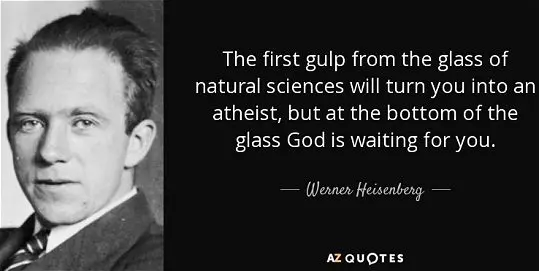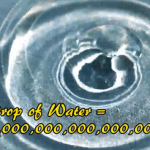[Originally published as Memes: Spreading False Ideas Since 1980]
If you have spent much time on the internet, I am sure you have seen memes like the one shown above. They usually contain a picture and some sort of message. I really enjoy the funny ones, but I typically don’t like the serious ones. It’s not because I don’t enjoy being serious. It’s because you rarely know whether or not the information in the meme is trustworthy.
Consider, for example, the meme shown above. It attributes a quote to Dr. Werner Heisenberg, a giant in the field of quantum mechanics. Indeed, his work continues to guide our understanding of the atomic world. I fully agree with the quote, and I deeply respect Dr. Heisenberg. There is only one problem: the meme is almost certainly false.
A Facebook friend posted it on my wall because she knew that I would agree with it. However, I had read a lot of Heisenberg’s work, and the quote didn’t seem to fit the person whom I had come to know through my reading. Consider, for example, his main work on the relationship between science and religion. It is called “Scientific Truth and Religious Truth,” and it was published in 1974 (two years before his death) in Universitas, a German review of the arts and sciences. In that work, he seems to argue that science and religion each arrive at truths, but the truths are unrelated to one another. Consider, for example, his own words:
The care to be taken in keeping the two languages, religious and scientific, apart from one another, should also include an avoidance of any weakening of their content by blending them. The correctness of tested scientific results cannot rationally be cast in doubt of religious thinking, and conversely, the ethical demands stemming from the heart of religious thinking ought not to be weakened by all too rational arguments from the field of science.
This is a common view among religious scientists. It is often called the “Nonoverlapping Magisteria” (NOMA) view, and it was championed by Dr. Stephen Jay Gould, an ardent evolutionary evangelist who died in 2002. I strongly disagree with the NOMA view, so when I read Dr. Heisenberg’s work, I was disappointed that he seemed to hold to it.
Obviously, someone who holds to the NOMA view would not say that God is waiting for you after you have drunk your fill from the “glass” of the natural sciences. Since Heisenberg wrote most of his work in German, I decided to use my limited knowledge of the language (which always amused my German Ph.D. adviser) and Google Translate to reconstruct the original quote.
Using the German version (“Der erste Trunk aus dem Becher der Naturwissenschaft macht atheistisch; aber auf dem Grund des Bechers wartet Gott”), the earliest reference I am able to find is in a 1979 book entitled 15 Jahrhunderte Würzburg. It is a history of Würzburg, the German city where Dr. Heisenberg was born. The quote appears in the margin of the text, attributed to him without any reference. It was picked up by many other authors, so it appears in many other books. As far as I can tell, however, this is its first appearance in print, and it occurred three years after Dr. Heisenberg’s death.
Given the facts that Dr. Heisenberg seemed to hold to the NOMA view, the first appearance of the quote seems to be three years after his death, and there is no reference for the quote, I think it’s safe to say that it was never uttered or written by Dr. Heisenberg. However, because of the reading I did for my elementary textbook Science in the Scientific Revolution, I recognized the essence of the quote. Sir Francis Bacon (1561-1626) wrote an essay entitled “Of Atheism,” and in that essay, he wrote:
It is true, that a little philosophy inclineth man’s mind to atheism; but depth in philosophy bringeth men’s minds about to religion. [Note: At this time in history, science was called “natural philosophy.”]
So while the quote in the meme above almost certainly isn’t real, its essence was written by a scientist who lived about 300 years before Dr. Heisenberg.
Supporting your position
The meme is unfortunate in at least two ways. First and foremost, it communicates false information. Second, there is no need for it. If you want to demonstrate that there are great scientists who were or are also believers, you can do that with real quotes from great scientists of the past and the present. Consider, for example, just a few:
“But the context of religion is a great background for doing science. In the words of Psalm 19, ‘The heavens declare the glory of God and the firmament showeth his handiwork.’ Thus scientific research is a worshipful act, in that it reveals more of the wonders of God’s creation.” -Dr. Arthur Leonard Schawlow, who shared the 1981 Nobel Prize in Physics with Nicolaas Bloembergen and Kai Siegbahn
(Cosmos, Bios, Theos, Henry Margenau and Roy Abraham Varghese, ed., Open Court Publishing 1992, p. 106.)“The significance and joy in my science comes in those occasional moments of discovering something new and saying to myself, ‘So that’s how God did it.’ My goal is to understand a little corner of God’s plan.” -Dr. Henry F. Schaefer, III, director of the Center for Computational Chemistry at the University of Georgia
(Henry F. Schaefer, Science and Christianity: Conflict Or Coherence?, The Apollos Trust 2003, p. 42)“In the case of our human friends we take their existence for granted, not caring whether it is proven or not. Our relationship is such that we could read philosophical arguments designed to prove the non-existence of each other, and perhaps even be convinced by them – and then laugh over so odd a conclusion. I think it is something of the same kind of security we should seek in our relationship with God. The most flawless proof of the existence of God is no substitute for it; and if we have that relationship, the most convincing disproof is turned harmlessly aside. If I may say it with reverence, the soul and God laugh together over so odd a conclusion.” -Sir Arthur Stanley Eddington, one of the most important astronomers of the 20th century
(A. S. Eddington, “Science and the Unseen World,” The 22nd Swarthmore Lecture, July 22, 1929)
If you want to demonstrate that science can lead people to belief in God, once again, you can do so with real quotes, such as these:
“Both religion and science require a belief in God. For believers, God is in the beginning, and for physicists He is at the end of all considerations.” -Max Planck, who won the Nobel Prize for Physics in 1918
(Max Planck, Scientific Autobiography and Other Papers, F. Gaynor, trans, Philosophical Library 2007, p. 184)“Now if there is one Hallmark of true science, if there is one perception that scientific knowledge heightens, it is the spirit of wonder; the deeper that one goes, the more profound one’s insight, the more is one’s sense of wonder increased…Now this sense of wonder leads most scientists to a Superior Being…A Superior Intelligence, The Lord of all Creation and Natural Law.” -Abdus Salam, who shared the 1979 Nobel Prize in Physics with Sheldon Glashow and Steven Weinberg
(Abdus Salam, “Science and Religion: Reflections on Transcendence and Secularization,” in Cosmos, Bios, Theos, Henry Margenau and Roy Abraham Varghese, ed., Open Court Publishing 1992)
There is simply no need to manufacture quotes that tell us how science can lead a scientist to believe in God. I can say that with some confidence since science led me to believe in Him.








